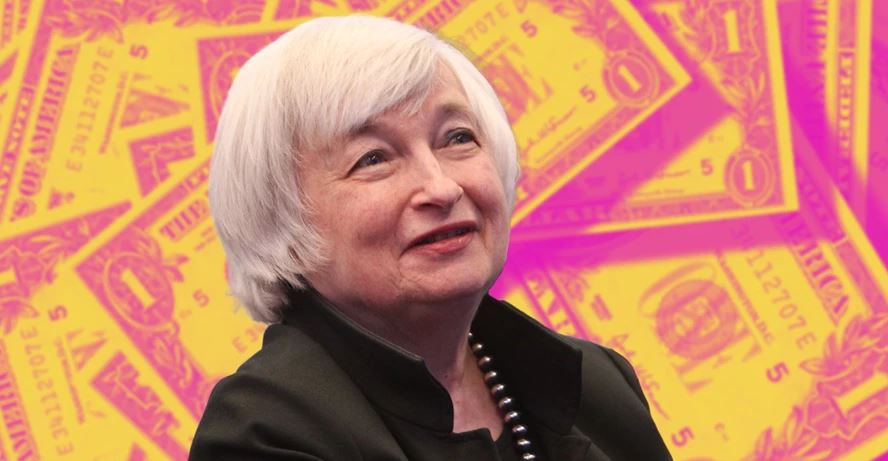 By Brad Polumbo
By Brad Polumbo
The Biden administration secured progress toward a major political victory this weekend, with the “G-7” group of seven wealthy countries agreeing in principle to a 15% minimum corporate tax rate. But average taxpayers will suffer if the White House’s global tax scheme ultimately comes to fruition—and here’s why.
Advocates argue that international coordination of corporate tax rates can remove one of the biggest hurdles to “taxing Big Business” by stopping a “race to the bottom” where countries lower their taxes to attract businesses and investment from overseas.
“[A 15%] global minimum tax would end the race-to-the-bottom in corporate taxation, and ensure fairness for the middle class and working people in the U.S. and around the world,” Treasury Secretary Janet Yellen said on Saturday. “The global minimum tax would also help the global economy thrive, by leveling the playing field for businesses and encouraging countries to compete on positive bases, such as educating and training our work forces and investing in research and development and infrastructure.”
That global minimum tax would end the race-to-the-bottom in corporate taxation, and ensure fairness for the middle class and working people in the U.S. and around the world.
— Secretary Janet Yellen (@SecYellen) June 5, 2021
The global minimum tax would also help the global economy thrive, by leveling the playing field for businesses and encouraging countries to compete on positive bases, such as educating and training our work forces and investing in research and development and infrastructure.
— Secretary Janet Yellen (@SecYellen) June 5, 2021
But while proponents like Yellen cite ending tax competition as the main selling point of a global corporate minimum rate, it’s actually what makes it such a destructive proposal.
First, let’s start with a few important facts.
Corporate taxes are not really paid by corporations. Economic theory and extensive empirical research alike confirm that workers and consumers bear the large majority of the real costs associated with corporate taxes, via lower wages and higher prices. More broadly, corporate taxes discourage investment, reduce economic growth, and kill jobs.
So it’s a good thing—not a problem—that countries can compete with each other for business by offering lower tax rates. This pressure keeps overall global corporate taxes lower, which is a boon for economic growth, workers, and consumers.
“Let’s have a ‘tax war,’” economist Dan Mitchell argued for FEE in 2017. “Folks on the left fret that this creates a ‘race to the bottom,’ but that’s because they favor big government and think our incomes belong to the state. As far as I’m concerned a ‘tax war’ is desirable because that means politicians are fighting each other and every bullet they fire (i.e., every tax they cut) is good news for the global economy.”
To see why tax competition is actually desirable, one need only look at the stunning success Ireland has achieved by offering a comparatively very low corporate tax rate of 12.5 percent. The Wall Street Journal editorial board has documented the results:
“Between 1986 and 2006, the economy grew to nearly 140% of the EU average from a mere two-thirds. Employment nearly doubled to two million, and the brain drain of the 1970s and 1980s reversed. Ireland became a destination for global capital. Oh and by the way: After Ireland slashed its rate and broadened the corporate-tax base, tax revenue soared.”
But trapping global businesses in one tax system wouldn’t just kill tax competition. As Larry Reed recently explained for FEE, it would also create a de facto international tax cartel.
“Imagine if oil companies got together and agreed to charge consumers no less than $3.50 per gallon for gas,” he writes. “If private firms connived to fix a minimum price for their goods, they would be branded ‘robber barons’ and their CEOs would be vilified before congressional committees.”
Indeed they would be. The politicians pushing this global tax scheme are no less corrupt because they hold elected office, and we should reject their efforts just as vociferously.
Like this story? Click here to sign up for the FEE Daily and get free-market news and analysis like this from Policy Correspondent Brad Polumbo in your inbox every weekday.
Source: FEE
Brad Polumbo (@Brad_Polumbo) is a libertarian-conservative journalist and Policy Correspondent at the Foundation for Economic Education.
Become a Patron!
Or support us at SubscribeStar
Donate cryptocurrency HERE
Subscribe to Activist Post for truth, peace, and freedom news. Follow us on Telegram, SoMee, HIVE, Flote, Minds, MeWe, Twitter, Gab, Ruqqus and What Really Happened.
Provide, Protect and Profit from what’s coming! Get a free issue of Counter Markets today.
One Huge Problem with the White House’s Plan for Global Taxation